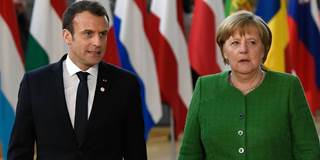Political leaders in France and, soon, Germany will have a chance to deliver the European Union from its malaise, but only by heeding the right lessons from the past. The success of grand bargains between France and Germany in 1963, and between the victors of World War II in 1944-1945, speak to the need for a bold, comprehensive approach.
PRINCETON – After years of paralysis during the debt crisis that began in 2009, the European Union seems to have regained some momentum. In France last year, Emmanuel Macron and his La République En Marche ! won the presidency and a strong parliamentary majority. And in Germany, after much delay, the center-left Social Democrats are currently voting on a new coalition agreement with the center-right Christian Democratic Union and its Bavarian sister party, the Christian Social Union.
The hope now is for renewed Franco-German cooperation and a new Élysée Treaty, updating the historic 1963 agreement negotiated by German Chancellor Konrad Adenauer and French President Charles de Gaulle. A new arrangement might involve more spending at the EU level and overcoming old German taboos against a “transfer union.”
But, to have the desired effect, the Franco-German vision for Europe must be fresh and bold enough to capture the popular imagination. Many Europeans are fed up with technocratic fixes negotiated behind the scenes and empty invocations of universal ideals. People need ideals, but they also need sensible, concrete measures.

PRINCETON – After years of paralysis during the debt crisis that began in 2009, the European Union seems to have regained some momentum. In France last year, Emmanuel Macron and his La République En Marche ! won the presidency and a strong parliamentary majority. And in Germany, after much delay, the center-left Social Democrats are currently voting on a new coalition agreement with the center-right Christian Democratic Union and its Bavarian sister party, the Christian Social Union.
The hope now is for renewed Franco-German cooperation and a new Élysée Treaty, updating the historic 1963 agreement negotiated by German Chancellor Konrad Adenauer and French President Charles de Gaulle. A new arrangement might involve more spending at the EU level and overcoming old German taboos against a “transfer union.”
But, to have the desired effect, the Franco-German vision for Europe must be fresh and bold enough to capture the popular imagination. Many Europeans are fed up with technocratic fixes negotiated behind the scenes and empty invocations of universal ideals. People need ideals, but they also need sensible, concrete measures.